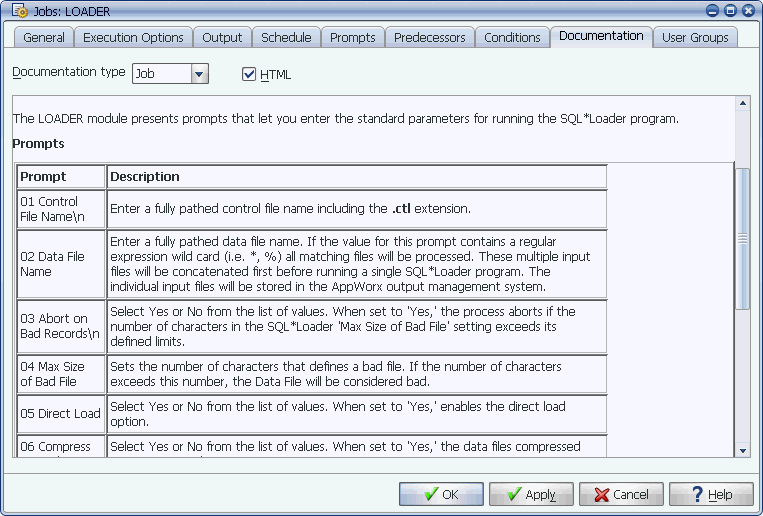
A note displayed in HTML format.
You can enter customizable general and abort documentation for jobs, process flows, and process flow components. By selecting an individual task and choosing Documentation, operators can access these comments, suggestions, or instructions.
Documentation provides a location to enter relevant information about the processing of tasks. Documentation for a sample LOADER job is shown below.

A note displayed in HTML format.
Types of Documentation
There are two types of customizable documentation: general and abort. General documentation usually contains information on goals and requirements or existing security and access issues. Abort documentation usually contains information on what action to take if a job aborts or fails, who to contact if a job aborts, or what considerations exist when running a task.
Documentation Locations
There are three locations within Applications Manager where you can enter documentation. Suggested uses for documentation are described in the table below:
| Location | Description |
|---|---|
|
Job |
Useful when the job is going to be requested ad hoc, or when the documentation for the job would be useful—regardless of how the job was invoked. |
|
Process flow |
Can be used to provide information which is relevant to the entire process flow. |
|
Process flow component |
Can be used to provide specific information about one component in a process flow. |
Documentation Format
You can enter documentation in plain text or in HTML format. If you enter HTML code and select the HTML check box, the note will be displayed in HTML format.
Including Hyperlinks and Images in HTML Documentation
You can add hyperlinks and images in HTML documentation. The links will work when the client is launched via Java Web Start. They will not work when you launch the client from the command line with the appworxj command (or in Motif startso client). You create links using standard HTML tags.
An example HTML hyperlink is shown below:
<P>Please visit the <a href="www.automic.com">Automic Corporate Web Site</a>.
An example linked graphic tag is shown below:
<P><img src="www.automic.com/images/index/indexlogo_small.gif" border="0">
You can link to images from the Applications Manager automation engine directory structure using the {codebase} environment variable. In the example below, an image named splash.png includes a hyperlink to the Automic Support site. The location of the image is the images directory under the directory specified by the {codebase} environment variable.
<center><a href="support.automic.com"><img height="126" width="602" alt="Applications Manager Support" src="{codebase}../images/splash.png" border="1"></a></p></center>
You cannot have a slash after {codebase}. Notice in the example above that two dots follow the {codebase} environment variable to go back one directory.
The default documentation for TEST_JOB includes example test and graphic links.
Procedure
To add documentation to a job, process flow, or process flow component:
When entering documentation remember:
Adding New Documentation Types
By default there are General and Abort documentation types for jobs, process flow, and process flow components. You may want to add an additional type. To do this log into the Applications Manager Oracle database and issue SQL such as the following. In this example, M specifies jobs for the note type, and Change History is the new note category.
SQL> insert into so_doc_types select 'M', 'Change History' from dual;
To create note types for process flows or process flow components you need to change the above M value accordingly:
Viewing Task Documentation
Users can view job, process flow, and process flow component documentation from the Backlog, History, Submit window, and Backlog Gantt View window. If a task aborts, an operator can view the specific abort documentation and make more effective operational decisions.